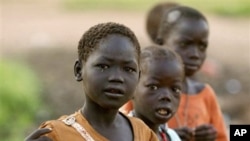JUBA —
The number of homeless children in Juba has jumped from around 1,200 four years ago to 3,000 today, a survey by a local non-governmental organization (NGO) shows.
Most of the children are orphans, but some live in the streets with their families and try to eke out a meager living by doing odd jobs, the Confident Children Out of Conflict (CCC) NGO says in the report released this week.
Hoi Koi is one of Juba's street children. He says he's been roaming the capital every day, asking people if he can shine their shoes in exchange for a bit of money, since he and his mother moved to Juba from Wau in the northwest of the country three years ago.
“I give the money to my mother and she uses it to buy food. I can raise 15 pounds every day... 20 pounds some days," he says proudly.
The report released this week by CCC found there are more than 3,000 children like Koi living on the streets of Juba. In a survey conducted by the state government and the United Nations in 2009, there were 1,200 children living on the streets.
CCC conducted this year's survey after local leaders in Gudele, just outside Juba, alerted the NGO to the growing problem of homeless children.
"The chiefs in Gudele came to CCC and they told us that we have to do something in Gudele, because the number of children who came from Khartoum, who are orphans, who are now sleeping in the trenches has increased, and they are really very vulnerable," CCC Director Cathy Groenendijk said at an event to release the report.
To try to help the children, CCC runs an orphanage and outreach center that currently puts a roof over the heads of 600 children and puts some food in their bellies.
The organization thinks "...the situation of children on the streets is going to increase and is going to get worse,” Groenendijk said.
South Sudan's Undersecretary of Labor Helen Achiro called the spike in homeless children who have to work to support themselves and their families, if they still have one, "alarming."
The National Assembly is considering draft legislation to protect South Sudanese children who take jobs in unsafe conditions, she said. The bill calls for children and NGOs to have the right to report labor abuses, including long hours and unsafe conditions, to the police. No date has been set to vote on it.
Most of the children are orphans, but some live in the streets with their families and try to eke out a meager living by doing odd jobs, the Confident Children Out of Conflict (CCC) NGO says in the report released this week.
Hoi Koi is one of Juba's street children. He says he's been roaming the capital every day, asking people if he can shine their shoes in exchange for a bit of money, since he and his mother moved to Juba from Wau in the northwest of the country three years ago.
“I give the money to my mother and she uses it to buy food. I can raise 15 pounds every day... 20 pounds some days," he says proudly.
The report released this week by CCC found there are more than 3,000 children like Koi living on the streets of Juba. In a survey conducted by the state government and the United Nations in 2009, there were 1,200 children living on the streets.
CCC conducted this year's survey after local leaders in Gudele, just outside Juba, alerted the NGO to the growing problem of homeless children.
"The chiefs in Gudele came to CCC and they told us that we have to do something in Gudele, because the number of children who came from Khartoum, who are orphans, who are now sleeping in the trenches has increased, and they are really very vulnerable," CCC Director Cathy Groenendijk said at an event to release the report.
To try to help the children, CCC runs an orphanage and outreach center that currently puts a roof over the heads of 600 children and puts some food in their bellies.
The organization thinks "...the situation of children on the streets is going to increase and is going to get worse,” Groenendijk said.
South Sudan's Undersecretary of Labor Helen Achiro called the spike in homeless children who have to work to support themselves and their families, if they still have one, "alarming."
The National Assembly is considering draft legislation to protect South Sudanese children who take jobs in unsafe conditions, she said. The bill calls for children and NGOs to have the right to report labor abuses, including long hours and unsafe conditions, to the police. No date has been set to vote on it.




